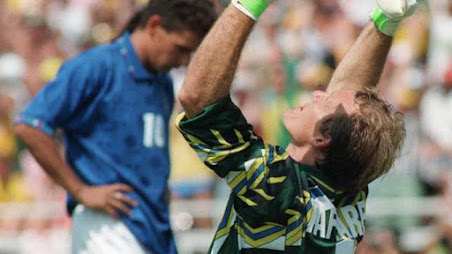Evangelicalism & Brazil: The religious movement that spread through a national team
It was derby day in Belo Horizonte, but that wouldn't change
anything. Joao Leite believed he had a mission assigned to him by Jesus Christ: to spread God's word among other football players.
So that afternoon in December 1982, just like he'd done for every match for the past three years, the Atletico Mineiro goalkeeper randomly approached an opponent before the big game started.
"Jesus loves you and I have a gift for you," he told Cruzeiro keeper Carlos Gomes as he presented him with a copy of the Bible.
At the time, Gomes found it all a little strange given the circumstances. He even admitted to feeling in some way angry as he was handed the book.
But that initial feeling later changed and he did actually join Leite's
religious movement - Athletes of Christ. He was far from the only convert.
An association of evangelical Christian sportspeople, Athletes of Christ counted some of the most influential people in Brazilian football among its membership.
At their first meeting they were four in number. That would grow to about 7,000 across 60 countries, including high-profile footballers such as 2007 Ballon d'Or winner Kaka and ex-Bayern Munich centre-back Lucio.
"It all began with Alex Dias Ribeiro, a Formula 1 driver who competed with 'Jesus Saves' slogans on his cars," Leite, who played five times for Brazil, tells BBC Sport.
"I decided to do the same and played with 'Christ Saves' on my shirt, but then the Brazilian Football Association banned it and threatened my team Atletico with a points deduction.
"It was then that I started to give Bibles to other players. But they were difficult times - there was so much prejudice against evangelical players. Not even the national team felt like a comfortable environment. It was not easy for me."
In 1980, around when Leite set out on his "mission", 88.9% of Brazil's population identified as Catholics. Evangelicalism - a movement within Protestant Christianity - accounted for 6.6%.
The balance has since changed considerably. Research from Datafolha, a polling institute, put those respective figures at 50% and 31% in 2021.
Brazil remains the world's largest Catholic nation, but by 2032 it's predicted evangelical churches will be drawing more worshipers in the country.

